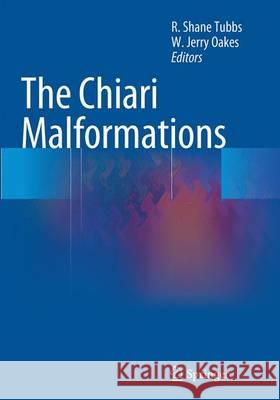The Chiari Malformations » książka



The Chiari Malformations
ISBN-13: 9781493942701 / Angielski / Miękka / 2016 / 377 str.
The Chiari Malformations
ISBN-13: 9781493942701 / Angielski / Miękka / 2016 / 377 str.
(netto: 839,65 VAT: 5%)
Najniższa cena z 30 dni: 844,38
ok. 16-18 dni roboczych.
Darmowa dostawa!
Focusing on the two most common forms of hindbrain herniation, the Chiari I and II malformations, this book reviews current understanding of the conditions, as well as their radiologic definition, details of operative intervention and prediction of outcome.
Ch.1: Introduction and Classification of the Chiari Malformations:
Shane Tubbs, Jerry Oakes
Ch. 2: The Chiari Malformations: a Historical Context
Shane Tubbs, Jerry Oakes
Ch. 3: Embryology of the Craniocervical Junction and Posterior Cranial Fossa
Shane Tubbs, Mohammadali Shoja, Jerry Oakes
Ch. 4: Embryology and Pathophysiology of the Chiari I and II Malformations
Shane Tubbs, Mohammadali Shoja, Jerry Oakes
Ch.5: Surgical Anatomy of the Craniocervical Junction Relevant to Chiari Malformations
Shane Tubbs, Mohammadali Shoja, Jerry Oakes, Marios Loukas
Ch. 6: Epidemiology of the Chiari I Malformation
John D. Heiss
Ch. 7: Genetics of the Chiari I and II Malformations
Christina A. Markunas, Allison E. Ashley-Koch, Simon G. Gregory
Ch. 8: Pathology of Chiari I and II Malformations
Lucy B. Rorke-Adams
Ch. 9: Pathology of Syringomyelia Due to Chiari Malformations
Keith Harrison
Ch. 10: Associated Disorders of Chiari Type I Malformations
Shane Tubbs, Jerry Oakes
Ch. 11: Chiari-like Malformation in Dogs
Dominic J. Marino, Curtis W. Dewey
Ch. 12: Radiology of the Chiari Malformations
Jim Barkovich, Abby E. Deans
Ch. 13: Research on the Pathophysiology of Chiari I-Related Symptoms and Syringomyelia, with Emphasis on Dynamic MRI Techniques
Carolina Sandoval-Garcia, Bermans J. Iskandar
Ch. 14: Associated Bony Malformations and Instability in the Chiari I Malformation
Arnold H. Menezes
Ch. 15: Non-Hindbrain Related Syringomyelia
Jorg Kleklamp
Ch. 16: Secondary Interventions for Chiari I Malformation
Jorg Kleklamp
Ch. 17: Scoliosis and Chiari I Malformations
Heather Spader, Douglas L. Brockmeyer
Ch. 18: Natural History of Chiari Malformations
Cormac O. Maher
Ch. 19: Newer Subsets: Chiari 0 and Chiari 1.5 Malformations
Nitin R. Mariwalla, William R. Boydston, Joshua J. Chem
Ch. 20: Clinical Presentation of Pediatric Chiari I Malformations
Curtis Rozzelle
Ch. 21: Clinical Presentation of the Adult Chiari I Malformation
Ulrich Batzdorf
Ch. 22: Unusual Presentations of the Chiari I Malformation
Christopher M. Bonfield, Elizabeth Tyler-Kabara
Ch. 23: Association Between Fibromyalgia, Chronic Fatigue, and the Chiari I Malformation
Richard Ellenbogen, David Bauer
Ch. 24: The Chiari Malformations and Hydrocephalus
James M. Johnston, John C. Wellons III
Ch. 25: Symptoms of the Chiari II Malformation
Jeffrey P. Blount
Ch. 26: Treatment of the Adult Chiari I Malformation
John D. Heiss, Edward H. Oldfield
Ch. 27: Treatment of the Pediatric Chiari I Malformation
Jerry Oakes
Ch. 28: Treatment of the Chiari II Malformation
Jerry Oakes
Ch. 29: Complications of Chiari Surgery
Tyler Auschwitz, Frederick Boop
Ch. 30: Outcomes for the Surgical Management of Chiari I and Chiari II Malformations
Nathan J. Ranalli, David D. Limbrick Jr., Tae Sung Park
Ch. 31: A Multidisciplinary Clinic for the Management of Chiari IMalformations
Leon S. Dure, Jerry Oakes, Chevis N. Shannon, Camille Broome, Curtis Rozzelle, Tony McGrath
Ch. 32: Chiari Malformations: a Patient’s Guide
Nadine Bradley, Haley Vance
Ch. 33: Conclusions
Shane Tubbs, Jerry Oakes
Once an uncommon clinical finding, the Chiari malformations are now frequently seen with the advent of more sophisticated imaging modalities. With more than one hundred years of experience with these entities, medicine currently has a much better understanding of the embryology and pathophysiology of the disorder. Long-term outcome studies are becoming more prevalent and patients are commonly operated on with generally favorable results. Comprehensive in design, the The Chiari Malformations focuses on the two most common forms of hindbrain herniation, the Chiari I and II malformations. Since the original description and classification of hindbrain hernias more than one hundred and twenty years ago, the Chiari malformations have revealed much of their pathophysiology and have become easily diagnosed radiologically. Indeed with the availability of MRI, more and more patients are being labeled with the diagnosis but without symptoms or appropriate symptoms. Timely and an invaluable addition to the literature, The Chiari Malformations thoroughly details the progress that has been made with our understanding of these conditions, their radiologic definition, details of operative intervention and prediction of outcome.
1997-2026 DolnySlask.com Agencja Internetowa
KrainaKsiazek.PL - Księgarnia Internetowa









